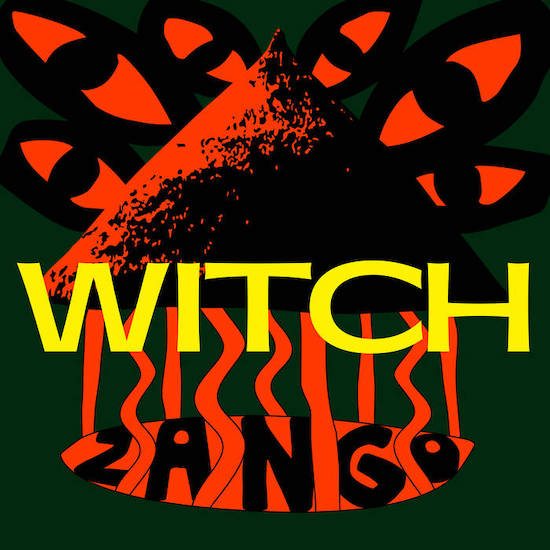WITCH formed over 50 years ago in the din of a newly independent Zambia. Alongside phantomic garage rockers Amanaz and afro-beat meddlers Musi-O-Tunya, WITCH stood at the vanguard of a lively and inventive music scene now widely known as ‘Zamrock’, and their original studio albums (particularly psychedelic opus Lukombo Vibes) stand up to the test of time as some of the best rock music ever created on the African continent. Their return is not just a joy, for the world always needs more great music, but a triumph against all the odds.
WITCH – an acronym, “We Intend To Cause Havoc” – were the most popular band from Zambia’s thriving 1970s music scene, but fizzled out at the turn of the 1980s. Authoritarianism snatched control of the left-wing Southern-Central African country, and harsh curfews all but wiped out the zealous nightlife scene of Lusaka.
Where Zamrock was given life by one government that deliberately cultivated the country’s music – then-president Kenneth Kaunda enforced a policy that 95% of all music on Zambia’s airwaves was to be from Zambia – the next government killed it dead in the water, and Zamrock would be a pasture unturned for decades.
As well as this, the area was ravaged by the AIDs crisis in the 1980s and 90s, and other than Emmanuel ‘Jagari’ Chanda – the group’s talismanic frontman, the whole of the original WITCH lineup lost their lives to the epidemic. Jagari would spend over three decades outside of music, as a gemstone miner and as a teacher, while his art went largely unheard both in his homeland and beyond.
Keys player Patrick Mwondela, who was briefly in an 80s incarnation of the band, and Jagari are the only Zambians in the group now, however this cultural identity runs rich through the record. Songs are sung in both English and the Chewa language, whilst features from Amanaz’s Keith Katwe, vocalist Hanna Tembo, and rapper Sampa the Great ensure that WITCH keep up the Zamrock traditions. It was also recorded at DB Studios, in the capital city Lusaka.
WITCH were very much in danger of being lost to the relentless tides of history. But now, in the year of 2023, back from beyond the brink and fresh off nearly a decade of worldwide reunion tours, we have before us a new album by WITCH, Zango, their first in 39 years.
“Like the story of the Phoenix”, Jagari cries on ‘Message from WITCH’, “the bird from the ashes – Zamrock has resurrected from decades of slumber.” The group that once lit up faraway lands with explosive psychedelic rock ‘n’ roll, with a far bigger audience – Zango is a fantastic resurrection. The 2010s saw a slew of Zamrock reissues, particularly WITCH’s complete works, but I say with confidence that this is better than all of them.
Zango demonstrates not only a group that has “still got it”, but showcases a band that has improved spectacularly over time. Aged like a cask of the finest wine. Châteauneuf de WITCH. World tours, precocious new members (Jacco Gardner and Nic Mauskovic make up the rhythm section), and four decades of new influences have made the WITCH sound far more potent than ever before – heavier, groovier and far more psychedelic. Absolute sonic sorcery.
‘Avalanche of Love’ is this in microcosm. It sounds so fresh that it puts every other comeback record by septuagenarian rock stars to shame. WITCH deploy a mutant disco groove with a stunning feature from tempestuous rapper Sampa the Great. Her blazing bars mangle with hellfire riffs to create the kind of gnostic rap rock you could previously only hear (at least, done this well) by crate digging hip hop producers like Edan and Dilla.
Elsewhere, ‘Waile’ combines the afrobeat rhythms you’d associate with West African music, with the guitar squall that underpinned the heyday of Zamrock. Indeed, Mauskovic approaches his role in WITCH with far more Tony Allen influence than WITCH’s original drummer Boidi Sinkala ever did. Jagari’s vocals are great here, his warbles in the Chewa language are hurried along by sections of pure noise and the tightest rhythm section South of the equator.
‘Malango’ also sees the rhythm section at their absolute best, as the group transcend to a state of pure space-funk bliss, Hanna Tembo and Theresa Ng’ambi’s free-form vocals ascending upwards with the music. ‘Stop the Rot’ and ‘These Eyes of Mine’ are respectively demonic and angelic garage rock nuggets, whilst opener ‘By The Time You Realize’ lands somewhere in between the two with a monster truck riff and pensive verses.
Zango covers a lot of ground, and whilst it may leave you yearning for a pure afro-funk opus and a flat out psychedelic garage romp separately, it is an incredibly dynamic record and the band thrive at both ends of the spectrum.
It’s wild that this album even exists, a WITCH album in 2023. Testament to the indomitable spirit of Jagari that – after losing his career to a despotic regime in the 70s and his bandmates to a tragic epidemic in the 80s and 90s – he is still going strong at 71 years of age, leading a volatile new lineup into the best phase of their career. Not only that, but Jagari himself seems to spend the duration of the record affirming “our message of positivity” – especially on ‘Message from WITCH’, a spoken word manifesto that closes the album with a concise and absolute statement. A beautiful resurrection for Zamrock, Zango is one of those rare records that, after living with it for a few months, still makes me feel something very profound. A triumphant return indeed.


